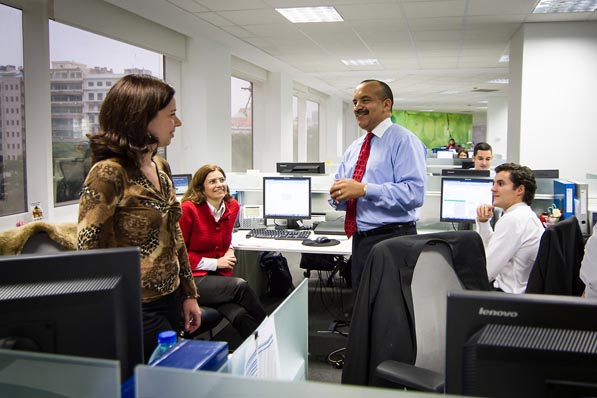Casa Central by the numbers
70
Homeless families are housed at La Posada Interim Housing Program as they transition into finding permanent jobs and homes
500
Preschool age children receive help preparing for kindergarten in Head Start groups
800
Home-bound senior citizens are visited regularly by home-care aides who provide basic assistance
500
Domestic abuse victims receive counseling and support through Casa Central’s Violence Prevention and Intervention services
Ann Alvarez’s passion for serving the poor and marginalized in neighborhoods throughout Chicago was first ignited during her childhood in Brooklyn. “I was born and raised in New York in an underserved community. From a young age, I was exposed to community needs that were not being met.” She spent much of her formative years serving at her Presbyterian church. “The mission [of the church] focused on helping those who were less fortunate,” Alvarez remembers.
Today, Alvarez is in her 24th year as president of Casa Central, an organization that has provided social services to the Hispanic population in Chicago since 1954. The organization has grown to become one of the most well-respected social services agencies in the country with a staff of more than 550 and a budget of $17 million.
Alvarez did not always have ambitions to lead a nonprofit organization like Casa Central. Her husband, Casa Central founder Reverend Daniel Alvarez, left his post as executive director to work with the mayor of Chicago as commissioner of the Department of Human Services in 1989. Alvarez agreed to serve as president for a short period. “We all thought it was going to be two years max,” she recalls with a laugh. Alvarez was quick to say why she has stayed all these years. “I’ve loved my work here because of the challenge, the opportunity to reach people in the community that need services to sustain their families and move on to meet their goals of employment, our programs for the elderly, and early learning programs. I can see directly how what we offer has a sustainable impact on families.”
Alvarez credits the success of Casa Central to four key aspects: implementing best practices, bringing in highly talented people in management, building a solid infrastructure, and continuing the tradition of the mission—to offer transformational services that propel people of all ages toward self sufficiency and a higher quality of life.
Casa Central’s programs focus on serving children and youth, seniors, and homeless families. La Posada Interim Housing Program for Homeless Families has offered housing and support to homeless families since 1989. Casa Central renovated two buildings that accommodate up to 20 families. The fully equipped apartments house families ranging in stay from four months or more. As parents reestablish themselves in the community, children have the consistency of going to school. Parents receive training and counseling with the goal of finding employment and getting back on their feet. According to Alvarez, the program has had astounding results. “Eighty-five to 90 percent of these families do not become homeless again. They take ownership of their goals. They become part of the solution. We cannot really solve their problems for them. We help and coach them and provide resources,” Alvarez says.
Services for children include after school programming, tutoring, Head Start programs in three child-development sites, and a home-based Head Start Program. Seniors have opportunities to interact daily in wellness programs, activities, and social events. Seniors also receive home-care services. “Their quality of life improves tremendously,” Alvarez says. The Casa Central Certified Nursing Assistant training program offers low-income people the opportunity to begin their nursing career.
“We offer 21 different programs and services. We’ve been affirmed and acknowledged because of the demonstration of quality. It all goes back to impact,” Alvarez says.
Alvarez names “integrity” as her greatest value in her work. “Are we functioning with best practices? Are we following the rules even with limited resources?”
Thoughtfully Alvarez adds, “When I look at the faces of the children and seniors, how they benefit, that keeps me going.”

